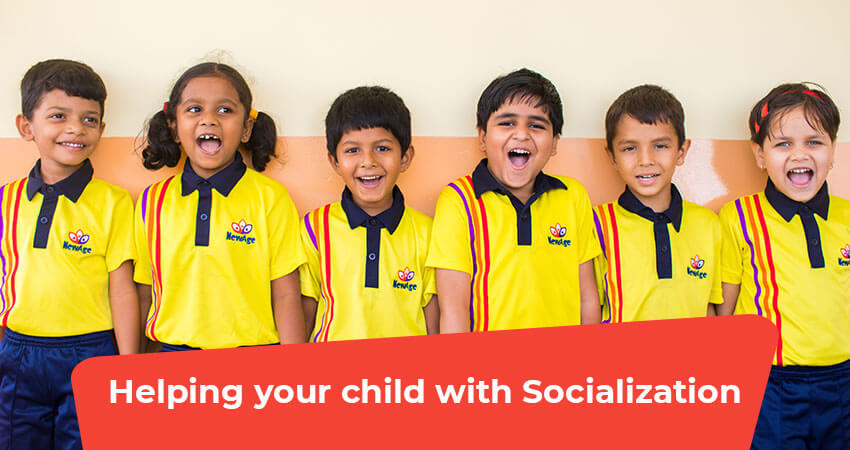

Socialization begins right after birth, with the younger years being the most crucial of the socialization process. Through socializing, children are exposed to our culture, language, manners, and learn about our society. Socialization helps to make up our personality. When people are successfully socialized, they are more likely to fit into society better and get along with others more easily.
When a child is school-ready, they will be introduced to many different children and their social interactions will increase. They will be expected to exhibit social skills such as cooperation, sharing, listening, communicating, good manners and conflict resolution. This can be a challenge when expectations are placed on them in a classroom environment and some may need more guidance than others. For one reason or another, some Pre Schoolers do not develop social skills as easily as others. They may earnestly seek peer relationships and then, having endured rebuffs, they retreat to the safety of home, family, and their own company.
It is during these first few years of life that parents will want to introduce their child to new places, people and activities. It is also through socialization that children will begin learning about things like empathy, and will experience a range of emotions. They will learn trust, how to be generous, and the best way to nurture a relationship
To determine if your child is developing healthy social skills, ask yourself a few of these questions:
To encourage social development with your children, try to get them involved with other people, and in new situations from time to time. It does not need to be a daily thing, but periodic events and encounters will help to get them to feel more comfortable with the process. Other things you can do include:
Children need the opportunity to play with other children and to be around adults in a social manner. When they are socializing, only intervene when absolutely necessary, and give positive feedback, so they feel more confident the next time. If things did not go well, talk about what they could do to help it to go better the next time.
Social interaction is important during this time. Children begin forming friendships and engaging in unorganized play with others. They will also have many disputes while playing. This is an important time to teach children about rules, and getting along with others.
Once children start school, they begin to choose their own friends, play cooperatively with others, and engage in more fair play. All of these stages are important steps in the quest for healthy social emotional development. Giving your child the opportunity to engage in socialization is easier than you may think. All you need to do is take them to a weekly class, a library story time, and/or playgroup in your area.
All of the social interaction you have provided for your child will spill over into the school situation, and you can be sure that teachers will be very grateful. (Too often the child reaches the classroom totally untutored in social relationships, and the teacher is expected to do the job.) Most teachers will react favorably to a request for a conference on social needs. This is the time to explain what you have tried to do on the home front. You can discuss your child’s needs for a special friend. After becoming familiar with the personalities of the tiny tots in his/her class, perhaps the teacher can arrange to team your child with another child of similar disposition and interests in terms of seating, play-pairs, playground-pairs and even walking to and from school.
There are times when a parent must reach out for help, and it is generally the mother, who, faced with this assignment, is going to have to scan the available candidates in the neighborhood and to select a child who would make an appropriate playmate. At this age and under these circumstances boys and girls play equally well together.
Many children enjoy art classes or music classes, and many websites provides guidance on how to choose the right programs for your child. First, pick fun activities, an art teacher, for example, should embrace your child’s messy creativity, not try to teach him the one and only correct way to hold a paintbrush. It’s important not to force your child to join in, although gentle, friendly coaxing is okay.
Spending time with other children is a key benefit for your child, so make sure the class truly focuses on children of the same age group, rather than having a roomful of looming kindergarteners. Also make sure that safety is carefully considered, and the equipment, supplies and instruction are all scaled to your child’s developmental level. If your child doesn’t seem ready for these activities yet, don’t worry. And, no matter how much your child does enjoy them, don’t overschedule him or her.
During the period of social growth there will be minor triumphs, but the road will undoubtedly be rutted with an occasional disaster. Parents should not be disheartened. Children tend to have spurts of physical, intellectual, and social growth laced with periods of holding their own or even periods of regression. The key words are structure and fun, with simplicity. The key attitudes are warmth and optimism. And if you treat your child like a worthwhile human being, it is much more likely that other children will also sense the child’s worth
Leave a Reply
Your email address will not be published. Required fields are marked *
Comments
No comments available